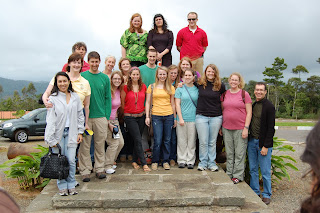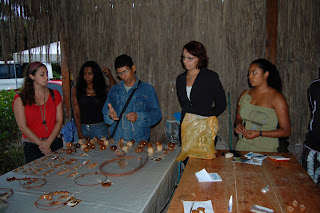
Today we took a long bus trip up in the mountainous rain forest to the "base" of an association called "AGRI" or the "Guardian Association of the Pratigi APA" (http://www.pratigi.org/portal/index.php?lang=us). Pratigi is a special region of the state of Bahia in Brasil that is rich in African heritage. Over 70% of residents in Bahia are of African decent. Unfortunately, the majority of these people live beneath poverty level--and the poverty level here is much lower than what we determine to be "poverty" in the USA. Approximately 60% of the residents of Bahia (one of the poorest states in Brasil) live on less than $R30 (or about 20 $US) each month.

AGRI's mission is to teach the people of this area ways to create sustainable income for themselves, in environmentally-friendly ways, while at the same time preserving their African heritage. They have won awards for their efforts from the United Nations, and receive donations from companies and persons from all over the world to support their cause. While it takes a lot of money to get many of their programs started, the idea is that they will educate citizens and create small sustainable businesses for small towns to sustain themselves.

We first toured their "base" where we learned about the association, saw the bungalows that house those who come to learn more about the association and work for the association, and have lunch. The road to the the base was very interesting--made from materials found in Bahia, utilizing very little energy to construct, and of a design to allow maximum abatement of the torrential rain that they can get.

We then took a long bus tour of the mountains of Bahia, through several small towns, to get to one of their cooperatives. The sights were truly mind boggling. There was the absolute beauty of nature--the mountains and rain forest--shacks stacked on shacks with satellite dishes, laundry hanging everywhere, bars on windows, garbage strewn everywhere, small fires where people were burning their garbage (I can't get the smell out of my nose), and even school children marching for the idea of protecting the environment. The sights of the day were so intermixed and contradictory that it really makes me ponder about our own ways in the USA.




At this cooperative, students are taught how to create baskets and other woven crafts out of Piacava fibers (a small coconut-type tree). They also teach how to make jewelry and other items out of the nut itself. Finally, they also teach skills such as planting and growing important plants and the need for proper care of our environmental resources. Just across the street from this coop they have created a small factory that employs many people from the region making crafts from the Piacava plant.





AGRI has several other units that it supports to teach the people of Bahia a more economically friendly, sustainable, and profitable way of life, and has plans for venturing into more areas in the near future. What they are doing is still new, but will have lifetime effects on the area.
No comments:
Post a Comment